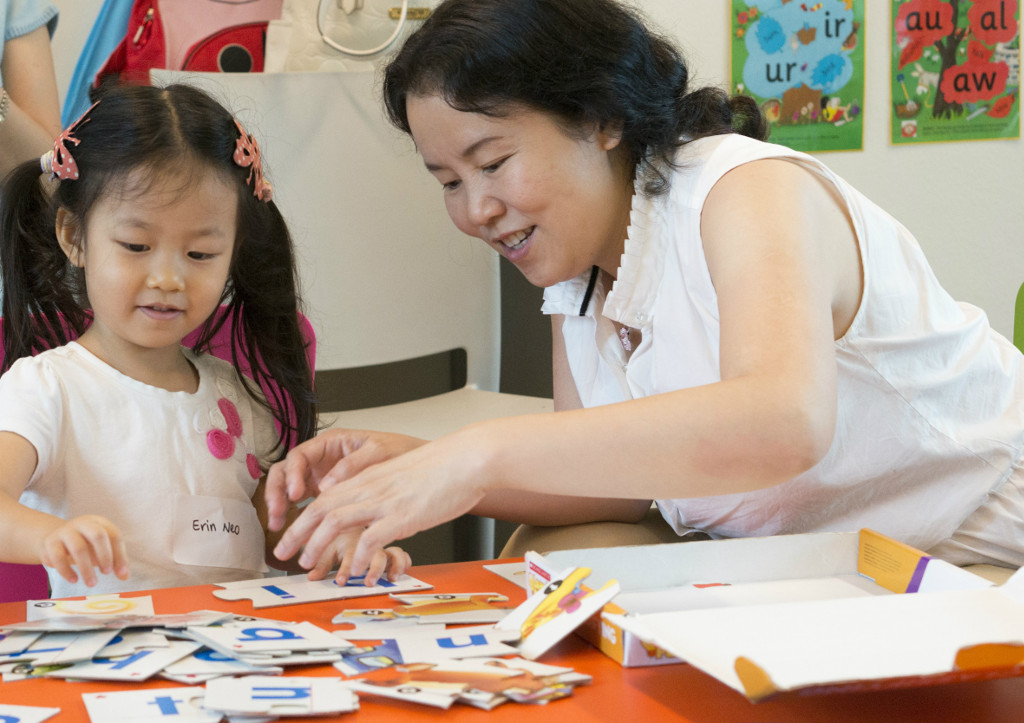SingaporeMotherhood | Parenting
March 2017
Improve Your Preschooler’s Reading Skills with These 9 Fun Activities That You Can Do at Home

The importance of picking up reading skills early is indisputable, but apart from plying our kids with lots of books, what can parents do at home? An expert from the British Council offers some suggestions.
Children are like sponges, absorbing every single thing they encounter. This means that every single day, starting in infancy, they are learning about sounds and letters, gradually becoming aware of books and words in print. With the right environment, by the time they are preschoolers, they will not just be equipped with the foundational skills needed to do well in school, but should also have acquired a lifelong love for reading.
And no, we can’t just leave it to their kindergarten teachers. So what can parents do at home? For starters, if you and your spouse aren’t already readers, then it’s time to well, start.
“Parents should provide an example of the importance of reading through being active readers themselves. If we are unable to show that we enjoy the experience of reading, many children will view the process in a similar light,” explains Mr Matthew Scott, Head of Pre-school Courses at the British Council.
[banner][/banner]
He goes on to say, “If a child forms a negative response to something, it is very difficult to persuade them to engage with it and therefore it is vital that we find ways to instil a love of reading in our children.” Parents, you know this acutely – if your child ‘hates’ veggies, for example, how difficult is it to get them to even try anything green and leafy? The same principle applies to reading.
What if daddy and mummy are already bookworms? That’s great! Your child is probably already growing up in a book-friendly setting.
“The home should be a place of enquiry where books of different sizes, types and topics can be found everywhere and are readily available. By providing choices, the child will be able to find topics that interest them,” advises Mr Scott. “This environment will also encourage children to reach into areas that will expand their vocabulary and develop their understanding of the wider world.”
(See also: How I Got my Child to Read Independently by age 3 (plus books you can read with your kids this holiday!))
 Credit: The British Council, Singapore
Credit: The British Council, Singapore
To help your child build his reading skills and gear up for the exciting world of books, here are nine fun activities you can do at home together:
1. Phonics Pelmanism
Write or print a selection of words on cards, then cut each word into two – separating syllables is a good place to start. Your child must then match the halves together to form words. This is reading on a simple word level, but can be stretched to cut up sentences once he is comfortable with reading single words. This fun activity will help your child to recognise spelling patterns and collocations. (‘Pelmanism’ refers to a memory-training game using a system of matching cards.)
2. Picture Dictionary
Get your child to help pick out a notebook, and use it to create his own dictionary. After every reading session, ask him to write down any unfamiliar words and draw pictures next to the words. The words can be organised in alphabetical order or by phonemes. This is a useful aid for preschool and Primary One learners, a visually stimulating way of helping them build reading skills and vocabulary awareness.
(See also: Reading with Your Child)
3. Predicting Content
For preschoolers, it’s important to set time aside to read to and with your child. One simple task to keep him interested in the story and develop his reading skills is asking him to predict what will happen on the next page. This way, your child is able to visualise some of the content and begins to acquire some basic inferring skills. Remember, there is no ‘wrong’ answer – encouraging imagination is important too!
Lalitha Sinniah, a 35-year-old assistant operations manager, has found doing this activity with her five-year-old very rewarding. “I’ve discovered that re-reading a book with my child is gold. I’m amazed with the sounds she’s able to grasp and her understanding of vocabulary found in the book. By getting her to guess what will happen next helps her to immerse herself completely in the book,” says Lalitha.
(See also: The Unexpected Joy of Predictable Books)

4. Write Your Own Book
Start with a large blank notebook. Have your child draw a picture on a left-hand page, and make up a story about it. You then write the dictated story down on the facing page. Then read it together. Your child will be empowered to know he can be an author too! As his reading skills and writing abilities grow, have him write down the stories himself. This could also be the start of his own journal. Create recipe books (even if the food isn’t edible!), animal magazines, anything your child is interested in. Because writing helps children become better readers, and reading helps children become better writers too!
5. Content Sequencing
After reading a storybook together, write down six to eight sentences that describe incidents in the story on separate pieces of paper. Your child must then arrange them in chronological order. Children will only develop a love for reading if they truly understand what they have read. Sadly, very often, fluency and pronunciation are emphasised at the expense of content and comprehension.
(See also: 5 Illustrated Books that Children should Read at least Once)
6. Scavenger Hunt
Again, read a storybook with your child. Afterwards, give them a short summary of the story (about 100 to 200 words) but with several words cut out of it. Place these ‘missing’ words around the room or your home. Your child must then try to find the words to fill the gaps. This activity will help children to contextualise language. For a higher level skill, throw in additional words that don’t belong in the story as ‘decoys’.

7. Correct the Sentence
This is one for more proficient readers. Write out six sentences from a story you’ve read together, but throw in some mistakes. Tell your child that he is now the teacher. His task is to correct the ‘mistakes’ by skimming and scanning the text. Start with simple spelling errors and make the activity more challenging (adding grammatical and factual errors, for example) as your child’s reading skills progress.
(See also: 15 Singaporean Authors (& Celebs) & Their Favourite Childhood Books)
8. Play Word Games
Games like ‘I Spy’ − “I spy with my little eye something beginning with shhh,” can help children make sense of how words are put together. Use sounds like “buh” and “fff”, rather than names of letters like “B” or “F”, and ask your child to guess what item you are looking at. Take turns to ask the question and encourage him to sound words out. Another game is to form words that rhyme (even if they’re nonsensical words) − “What words sound like ‘car’?” Rhymes help children learn word patterns and how words are created.
9. Read Everything
Reading doesn’t always have to mean sitting down with a book. When watching TV together, make it a point to read words that pop up on screen. Read out a recipe as you make the dish while your child is in the kitchen with you. Take him to the library or bookstore and have him read the titles on book covers, then ask him to guess what the book is about. Ask your child to try sounding out words on advertising boards at bus stops and signboards on shop fronts. The key to encouraging a prolific reader is to never stop reading!
Educator Choo Yu-Lin, 37, does this with her two boys, aged three and six. “One of the things I make it a point to do is to read every word we come across when we’re out. This could be anything from the ‘STOP’ sign at the junction to food labels at the supermarket. I started doing it with my big boy when he started Nursery One, and he’s now doing it in turn for his little brother!”
Featured image courtesy of The British Council, Singapore
All content from this article, including images, cannot be reproduced without credits or written permission from SingaporeMotherhood.
Follow us on Facebook, Instagram, and Telegram for the latest article and promotion updates.





